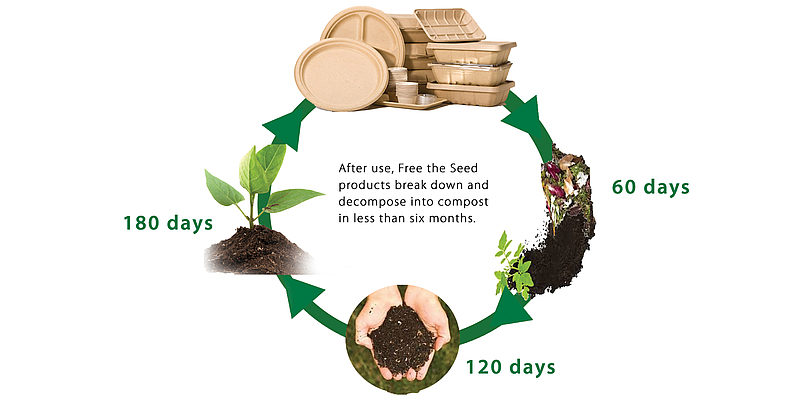Good business in Malaysia: Free the Seed

An enterprising firm in Malaysia is addressing a problem unwittingly created by farmers burning rice straw when they are preparing their soil.
Air pollution has been an ongoing problem in many countries in South-east Asia, and Malaysia is one of the worst affected. Each year a smoky haze blankets the country for months on end.
Although most of the smoke is produced by ‘slash and burn’ during forest clearance in neighbouring Indonesia, one of the other main causes of the haze is the burning of rice straw in Malaysia itself.
There are over 300,000 hectares of land devoted to rice paddy production on the Malaysian Peninsula, mostly small farms in the northern states of Kedah, Kelantan and Perlis. After each harvest, farmers burn rice straw to help prepare the soil for the next crop. The practice releases nutrients back into the ground and helps with pest control.
But the burning of an estimated 2.5 million tonnes of paddy straw after the harvest creates clouds of smoke that contribute to a haze that plays havoc on roads and hampers commercial flight operations from regional airports. The air pollution index often reaches dangerous levels, forcing schools to close. Large numbers of people in nearby villages and towns suffer from respiratory problems, like asthma. Sometimes, the haze completely blocks out the sun.
Free the Seed's biodegradable packaging
A partial solution to Malaysia’s haze problem is now being provided by Free the Seed, a company which is converting rice straw and husks into biodegradable packaging. The company uses its patented biotechnology process, utilizing protease serene enzymes, delignified cellulose fibers and enzymatic gratification methods, to produce packaging products that once used organically compost within six months.
A US$4m production factory has been constructed on a 10-acre site in Gurun in Kedah state, and the first phase of the business began in 2015, when Free the Seed secured a 10-year supply agreement for rice straw biomass with the Kedah state farmers’ associations.
Free the Seed CEO, Ramaness Parasuraman, told UNIDO's Making It magazine, “With this initiative, the incidence of open burning is reduced and there is no further addition of harmful waste material into the environment.”
He said there has already been a direct impact on the lives of more than 1,300 farmers who each receive an average additional income of US$300 per year by selling previously burnt waste rice straw to Free the Seed. The number of farmers taking part in the scheme is expected to grow to 30,000 as the project goes full stream during 2017, and around 32,000 hectares of rice fields are expected to achieve zero open burning.
Cleantech Innovation Programme
Free the Seed’s progress was given a big boost when, in 2014, the company was selected as the national winner of the Global Cleantech Innovation Programme (GCIP) for SMEs in Malaysia, a programme that leverages the power of entrepreneurship to address challenging energy, environmental and economic problems. The Global Cleantech Innovation Programme for SMEs in Malaysia is implemented by the Malaysian Industry-Government Group for High Technology (MIGHT) and the United Nations Industrial Development Organization UNIDO), and is funded by the Global Environment Facility (GEF). It aims to develop a platform to nurture and accelerate the next generation of Malaysian cleantech entrepreneurs.
The 2014 round of the GCIP-Malaysia Competition and Accelerator Programme attracted over 60 applicants and 26 semi-finalists were selected to take part in the four-month Accelerator Programme. As the winner of the contest, Free the Seed’s CEO, Ramaness Parasuraman, received US$30,000 and an all-expenses-paid trip to San Francisco to attend the Cleantech Open Global Forum in Silicon Valley to receive the award and make connections with potential partners, customers and investors from around the world.
Parasuraman, told Making It that participating in GCIP was a game-changer for the company’s business. “The GCIP platform provides a unique, result-oriented platform for start-ups and green tech entrepreneurs for funding access and market access. We also benefitted from participating in international conferences organized by UNIDO, GEF and MIGHT.”
Judges at the GCIP-Malaysia 2014 said Free the Seed’s solution was innovative and had the potential to improve the livelihood of rice farmers.
Wealth out of waste
“Instead of letting the paddy husks go to waste, they’ve come up with a solution where farmers can supplement their income selling the paddy husks as raw material. It’s deriving wealth out of waste,” said one of the judges, Sam Shafie, cofounder of Malaysian crowdfunding platform, PitchIN.
“The global applicability of Free the Seed’s entry is one of its winning qualities”, said Kevin Braithwaite, global director of the Cleantech Open. “It has managed to attract and reach out to customers from all around the world, from healthcare providers to companies in the food and beverage industry.”
Parasuraman’s vision is to become one of the top 10 green packaging companies in the world by 2020. “In the next years, Free the Seed will expand to Europe and North America, delivering our product to customers, including Philips in Germany, Albert Heijn in the Netherlands, the Coop in the UK and Bunzl in Australia.”
In a recent media interview, the deputy CEO of Free the Seed, Tan Sri Dr Salleh Mohd Nor, said the company had just secured a contract to export a container-load of its environmentally friendly packaging products to the Netherlands.
“We will be exporting 40 containers of biodegradable fruit tray products over a span of three years with a total contract value of RM25 million (US$6m),” he said, adding, “We are confident that these non-toxic, soluble, biodegradable products will continue to grow as its usage will replace polystyrene and plastic containers.”
By Charles Arthur
originally published in Making It magazine as Good Business: Free the Seed